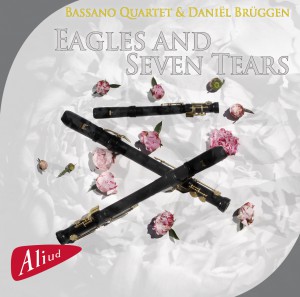 ‘Eagles and Seven Tears’ heet de nieuwe CD van het Bassano Quartet. Een album dat ze opnamen met blokfluitist Daniël Brüggen (oprichter van het Amsterdam Loeki Stardust en neef van de legendarische blokfluitist en dirigent Frans Brüggen). Op deze tweede CD worden bewerkingen en speciaal voor blokfluitensemble geschreven werken gespeeld in kwartet en kwintet bezetting.
‘Eagles and Seven Tears’ heet de nieuwe CD van het Bassano Quartet. Een album dat ze opnamen met blokfluitist Daniël Brüggen (oprichter van het Amsterdam Loeki Stardust en neef van de legendarische blokfluitist en dirigent Frans Brüggen). Op deze tweede CD worden bewerkingen en speciaal voor blokfluitensemble geschreven werken gespeeld in kwartet en kwintet bezetting.
English version below
De CD ‘Eagles and Seven Tears’ opent met een werk van F. J. Haydn dat hij oorspronkelijk schreef voor fluit en strijktrio. Het Nederlands blokfluitensemble Bassano Quartet bewerkte het voor vier blokfluiten waardoor de compositie vanuit een totaal andere invalshoek wordt belicht. Niet alleen spelen zij het werk een toon lager dan het origineel, ook de klankkleur van vier fluiten zorgt voor een soort opgewekte melancholie die in het tweede ‘Adagio’ deel bijzonder fraai tot zijn recht komt. Het Bassano Quartet klinkt coherent en mêleert tot één warme samenklank waarbij het soms lijkt alsof je naar een klein orgel (portatief) luistert. Deze harmonie vinden we ook terug in de bewerking van ‘Lachrimae or Seven Tears’ van John Dowland. Een 7-delige compositie die deze 16de eeuwse componist schreef voor viola da gamba kwintet en luit. Dowland bewerkte het lied ‘Flow my Tears’ (ook wel ‘Lachrimae’ genoemd: Latijns voor ‘Tranen’) tot verschillende stemmingen, voor verschillende sferen, zoals ‘oude’, ‘zuchtende’, ‘droevige’ of ’trouwe’ tranen. Deze versies zijn prachtig gearrangeerd door het Bassano Quartet en blokfluitist Daniël Brüggen. Waar partijen elkaar imiteren en fraai over elkaar heen duiken met in het eerste deel prachtig kleine chromatische lijnen. Naast een werk van Purcell, John Taverner, Jospeh Lupo en da Bologna staat er ook een aantal composities uit de 20ste eeuw op ‘Eagles and Seven Tears’. Prachtig is ‘Koraal 1‘ van Ronald Moelker. Een werk geïnspireerd op een gedicht van Rudy Bremer dat de deportatie van Joden uit Westerbork muzikaal vertaalt met lange melodische lijnen waarbij de samenklank intensiveert tot een dissonant slot. Bijzonder fraai is ook de saxofoonkwartetbewerking van Bob Mintzer’s ‘Slowly‘ (uit Quartet 1) waarmee het Bassano Quartet bewijst dat de blokfluit nog een hele mooie toekomst tegemoet gaat: geïllustreerd op deze luisterrijke en gevarieerde CD!
Concertopname van het Bassano Quartet met werk van hun debuut-CD ‘Torres del Alma‘.
English version
‘Eagles and Seven Tears‘ is the new CD of the Bassano Quartet. An album recorded with recorder player Daniël Brüggen (founder of the Amsterdam Loeki Stardust and nephew of the legendary recorder player and director Frans Brüggen). On this recording there are arrangements as well as especially for recorder ensemble composed works for quartet and quintet.
The CD ‘Eagles and Seven Tears‘ opens with a piece that F. J. Haydn originally wrote for flute and string trio. The Dutch recorder ensemble Bassano Quartet arranged it for four recorders. In this way the music of Haydn is exposed from a totally different angle. The Bassano Quartet plays the music a tone lower than the original and the sound of four flutes gives the music a kind of melancholy, wonderful in the second part ‘Adagio‘. The Bassano Quartet play coherent and the sound of four recorders melt into a wonderful musical atmosphere, like you’re listening to a small organ (portative). This harmony is also to be found in the composition ‘Lachrimae or Seven Tears’ by John Dowland. This 16th century composer wrote this seven-part composition for viola da gamba and lute. He composed the song ‘Flow my Tears’ (also called ‘Lachrimae‘ which means ‘Tears‘ in Latin). Dowland composed seven different moods for different ‘tears‘ like: ‘old’, ‘sighing’, ‘sad’ or ‘lover’s’ tears. These versions are beautifully arranged by the Bassano Quartet and recorder player Daniël Brüggen. Exciting how different melodies cross each other, with wonderful small chromatic lines at the end. Besides compositions of Purcell, John Taverner, Jospeh Lupo and da Bologna, there are also a number of compositions from the 20th century on ‘Eagles and Seven Tears’. Magnificent is the ‘Koraal 1‘ by Ronald Moelker. A composition with long melodic lines in which the harmony intensifies into a dissonant end. A work inspired by a poem by Rudy Bremer which illustrates the deportation of Jews from Westerbork in the Second World War. Particularly attractive is the saxophone quartet adaptation of ‘Slowly‘ (from Quartet 1), composed by Bob Mintzer in which the Bassano Quartet proves that the recorder is looking forward into a bright future. Glorious and varied CD!
- Bassano Quartet / Daniël Brüggen: ‘Eagles and Seven Tears‘ (Aliud Records/New Arts International)
© Mattie Poels.

Geen reacties